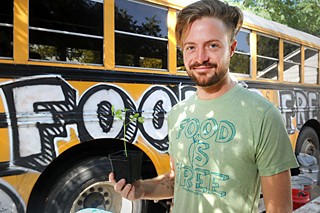Our Fair Share
Good food doesn't have to cost the Earth
By Jessi Cape, Fri., Aug. 29, 2014
"We imagine a world where food production returns to the neighborhoods. Empty lots, rooftops, front and back yards, and parks can be edible landscapes," says Food Is Free Project founder John VanDeusen Edwards. "We'll be eating fresher, healthier food, building community and making safer, more connecting neighborhoods that open doors for further collaboration. We call it the new normal."
Edwards is among a growing number of local visionaries fighting the old normal, fueling a food system shake-up. Austin's culinary scene may be burgeoning, but that doesn't mean the larger food system is equitable. The problems are many, ranging from hunger to industrialized agriculture, and the solutions will not sprout from conventional thinking alone. Increasingly, the answers are found in disruption – leveling the field with new economic models. Money may not grow on trees, but food does.
Food preservation guru Kate Payne says she started the original Brooklyn-based food swap group, BK Swappers, "just because [she] had too much marmalade." She took it to Twitter, and ended up with rooftop bees' honey and some sauerkraut. Upon returning to Austin, Payne teamed up with food blogger Megan Myers to host Austin's first swap group, ATX Swappers, and their 21st swap is planned for October 4. The basic idea is simple: Participants make enough individual homemade food items to trade. Personal choice is paramount, and value is placed on a one-for-one model. Open to the public, there is a small administrative fee ($3) charged with the ticket, but otherwise no money is exchanged.
Payne says the trade "encourages people to see the value behind artisan work. ... It's about looking at value in all the different ways. We kind of urge people to see value in that someone else has prepared this, from scratch, on their own. And that a homemade thing is kind of invaluable."
The most recent swap at the Sustainable Food Center featured a bounty – giant toffee apple-pie meringues from Fluff Meringues & More, freshly rolled egg rolls, scratch chocolate pudding, pickled rainbow peppers, grapefruit bitters, a fire cider sample, and "mothers" to make pear vinegar. As more families choose homesteading and DIY to shake up the reliance on prepackaged foods, the demographics have become surprisingly diverse.
Payne said that's standard these days, growing over time from primarily women-centric events to the recent swaps where men are actively participating and swapping homemade tequila sauces. She says the chats with strangers are nice, and that "it just shows who's out there doing the same things as you, and sometimes it's people you wouldn't necessarily expect who are interested in these types of things. Whether it's baking or pickling or brewing beer or whatever."
The concept depends on the simple idea of sharing, but the food doesn't have to come in a Mason jar. Edwards seeks to return agriculture to its roots. A big proponent of capsule "yardens," he has started a model project that seeks to redefine "local," inspiring more than 150 cities across the globe. "We see the frontyard garden as a key that opens the door to community," he says.
His Food Is Free Project is a homegrown "open-source grassroots movement to grow food in public places and share it with the community" that has expanded rapidly since 2011. Edwards says he planted a frontyard garden as an experiment, despite space behind a privacy fence. "[Though] I felt vulnerable in the frontyard, it was also kind of magical ... Something as simple as a garden created a real human moment of interaction that would have otherwise not happened if I were hidden in the backyard." He contacted friends, organized a community potluck, and in five weeks' time, nonparticipants became the minority. Now his block has a community composting program, tool sharing, an outdoor community kitchen, film screenings, and workshops.
Of this peaceful rebellion, Edwards says: "In a world where we're taught that 'there's no such thing as a free lunch,' we're excited to offer another alternative. ... If something as simple as a frontyard garden can get us to think differently about our food, then we start to open up and question other aspects of our lives. That tomato can then cause us to quit our job, leave what doesn't serve us, and start to explore our passion and how we can give back to the world."
Food Is Free encourages participants to use the project name, logo, and hashtag, and embrace their city's unique qualities. Creativity, volunteerism, salvaged resources, and online how-to videos for their signature raised garden wicking beds are essential ingredients. Using materials like old pallets and used political signs, their model conserves water and drastically reduces cost, increasing accessibility. They're also developing an online platform to organize food sharing, and he says the future plans include start-up mini-grants for cities. Not having a yard doesn't exclude, either. Edwards mentions container gardening on rooftops, in windows, and in shared courtyards. Guerrilla-gardening bicyclists can plant tomato plants in concrete cracks. The idea is to get creative, and use the buddy system. "Never plant a garden alone," says Edwards.
"Growing up in Austin and seeing it grow and change so much," Edwards says, "I really feel like we have a great opportunity to lead by example. We all hear a lot of folks complain about people moving to Austin, but the way I see it, what if we were in Detroit's shoes, with everyone leaving the city? With such exponential growth, the time to act is now to start implementing systems that integrate local food into our neighborhoods to feed our growing population."
Edwards admits the Food Is Free name has "also ruffled some feathers," but attributes the food system's social implications, such as hunger, in part to a rampant disconnect between food sources and nature. "We believe that we need to free food from the reins of a broken agricultural system that is reliant on cheap oil. It's crazy that the flavorless tomato in our salad was shipped a thousand miles, when it could come from right next door and blow us away with a flavor we've never known."
But really, it all comes down to meeting your neighbors and having conversations. What can be bought can be made or grown. What comes from the community can be given back. "Food connects us and is one thing that we certainly all share," says Edwards. "When we find something that unites us, all of our differences fall by the wayside and we realize that we're much more alike than different."









